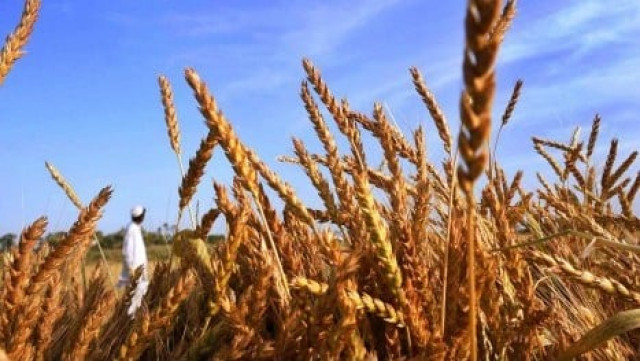Consumers pay for low wheat release
Punjab asks federal govt to provide 1m tons of grain

Wheat price is continuing to rise in Punjab owing to an inefficient price control mechanism, limited availability of the grain and profiteering.
Grain dealers blame limited availability of stocks for the rise in wheat price across the province besides a recent announcement of Rs4,000 per maund support price for the next crop by the Sindh government.
A dealer said the wheat price was hovering between Rs3,500 and Rs3,700 per maund in grain markets across Punjab.
A former chairman of Pakistan Flour Mills Association (PFMA) told The Express Tribune that multiple factors contributed to increase in wheat support prices. Usually, all provincial governments increase wheat supplies from their godowns during the ongoing season to rein in increasing price in the markets.
This time, owing to floods and limited availability of stocks the governments of Sindh, Balochistan and Khyber-Pakhtunkhwa have virtually stopped the supply of wheat from government godowns.
“Right now, only the Punjab Food Department is making small releases as estimates suggest the province is facing a shortage of over one million tons of wheat,” he said.
He highlighted that Punjab had requested the federal government to provide one million tons of wheat but the demand had not yet been met because of a political tug of war between Lahore and Islamabad.
In a recent meeting, Punjab Chief Minister Chaudhry Pervaiz Elahi also highlighted that several hundred thousand tons of wheat had been swept away due to floods in the province.
Currently there is a shortfall of around one million tons of wheat to meet the province’s demand but the federal government has ignored Punjab while providing wheat stocks to other provinces.
He said the Punjab government had strongly protested over double standards of the federation and indicated that the provincial government would register its protest before Islamabad by sending an official letter.
The federal government is playing a part of the stepmother by not providing wheat stocks to Punjab, said Elahi. Despite a request, the federal government did not entertain the province’s demand.
A tussle between the federal government and Punjab along with profiteering have not only created shortage of wheat flour in urban centres but also made it dearer for citizens. Citizens complain that the price of wheat flour is continuously rising but flour sacks are still not available in the markets.
A resident of Lahore, Tahir Bhatti, said he had to visit four shops to buy a sack of wheat flour as most shopkeepers were out of stock. He also complained of shortage of wheat flour and cooking oil at utility stores in the city.
“The government earlier had multiplied utility and petroleum tariffs and now it is snatching bread from citizens,” he lamented.
The prices have apparently spiked as a result of wheat shortage due to flooding, which intensified the flour crisis in Punjab.
The situation had resulted in scarcity of subsidised flour and black marketing. A bag of 20kg of subsidised flour is being sold at Rs1,350 instead of the fixed price of Rs980.
The flour mills, which are allowed to determine their own prices, have raised the price of a 15kg bag of flour to Rs1,600, with retail price reaching Rs1,650. Similarly, the mill owners have set the price of flour at Rs116 per kg but are selling it for up to Rs120.
Complaints of subsidised flour being sold in normal bags at higher price are on the rise. As a result, three different flour prices per kilogramme are prevalent and the regulatory mechanism is proving ineffective.
Currently, the market price of wheat is between Rs3,650 and Rs3,800 per maund. Mill owners claim they cannot sell flour for less than Rs120 per kg after purchasing the pricey wheat.
Published in The Express Tribune, September 20th, 2022.



















COMMENTS
Comments are moderated and generally will be posted if they are on-topic and not abusive.
For more information, please see our Comments FAQ